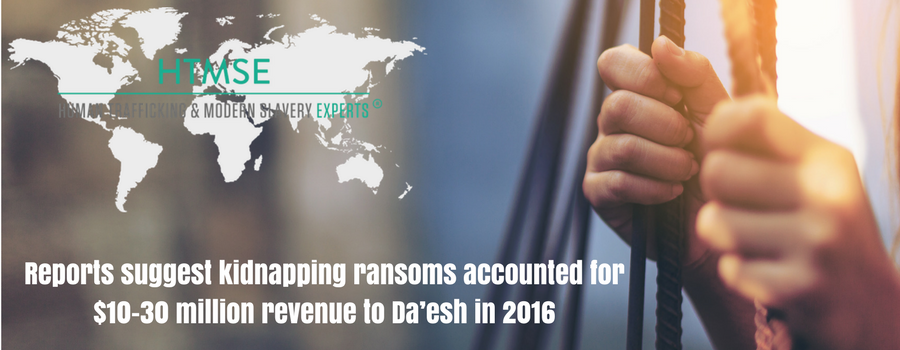
Issues of slavery, sexual servitude and trafficking are embedded as financing means in wider terror networks. The revenue produced by these means is used to sustain terrorist organisations, including the likes of Da’esh, Boko Haram, Al-Shabaab and the Lord’s Resistance Army. Such financing means are being used to replace traditional fund raising. Instead slavery, weapon trafficking, sexual violence are increasingly used for money laundering to finance terror measures. This is engrained further due to the ideological justifications of sexual violence.
The total capital value of the slavery and sex market feeding on going terror networks is unknown. Some reports suggest kidnapping ransoms account for $10-30 million revenue to Da’esh in 2016. Other reports refer to a list they published, detailing ‘spoils of war’ including Yazidi women and children sold as sex slaves, virgins having been auctioned through social media for upwards of $12,000 each. Many accounts suggest terror soldiers use the promise of sex slaves in their recruitment process, and punishment of ‘non believers’.
In 2016 a specific Resolution 2331 of the Untied Nations Security Council was passed to address human trafficking within areas of armed conflict, recognising that these are ‘tactics’ for terror groups and are perpetrated mercilessly through the ‘strategic objectives and ideology’ of such groups. It states “that trafficking in persons undermines the rule of law and contributes to other forms of transnational organised crime’’. The UN Resolution 2331 encourages its member states to align their national policy with the wider intentions of Women, Security and Peace and the UN Convention against Transnational Organised Crime. It targets the financial mechanisms between trafficking, large crime rings in conflict zones and terrorism.
Illicit economies make it difficult to protect victims and identify and apprehend perpetrators. However slavery and sexual servitude are considered war crimes and crimes against humanity, which have universal jurisdiction under the Commonwealth Criminal Code, deeming the location and nationality of the defendants irrelevant. There is need for legislation to address this nexus, and for enforcement by international forces and agencies on the ground in conflict zones. The definition of terrorism in both national and international law must be broadened to include sexual violence as a tactic, amongst the wider UN resolutions on Women, Peace and Security.